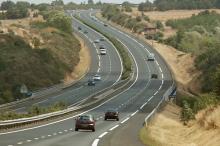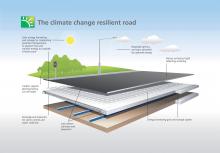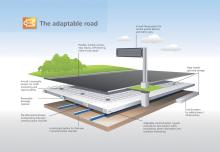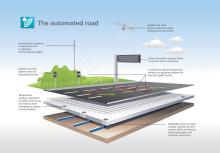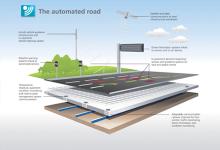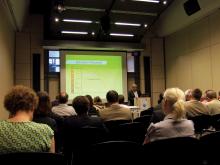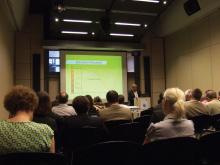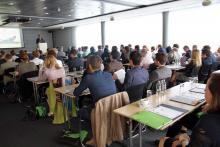FEHRL's fifth SERRP is set to drive road transport into the 21st century
The Forum of European National Highway Research Laboratories (FEHRL) has published its fifth Strategic European Road Research Programme (SERPP V), which tackles the research and innovation challenges facing the European road and transport system now and in the future.
Formed in 1989, FEHRL is a registered international association comprising more than 40 national research/technical centres, and its new programme reflects the techni

Roads provide the transport future ahead
FEHRL's fifth SERRP is set to drive road transport into the 21st century
TheFormed in 1989, FEHRL is a registered international association comprising more than 40 national research/technical centres, and its new programme reflects the technical and policy needs for road infrastructure and puts forward methods of delivering the needed research and innovation.
Covering the period 2011-2016, SERRP V details the planned programming and instruments for delivery of this research and innovation; considers international cooperation and multi-modality and gives key insights into the role of research, stakeholder concerns and needs and the vision underlying the programme.
The latest edition of the SERRP series differs from the previous by explicitly focusing on a core element, the Forever Open Road programme, which provides a truly inspiring vision for how roads will be built, operated and maintained in the 21st century.
In these times of austerity, the road sector and wider society is still recovering from the global financial crisis. Many national authorities across Europe and indeed globally are grappling with austerity measures, and facing ever tougher challenges to cope with the need to accommodate increased traffic growth, minimise congestion and maintain services in the face of increasing climate change effects, as well as deliver on environmental and societal objectives.
SERRP V takes these pressures into account, and also shows that, despite budget constraints, investment in innovation for road infrastructure is absolutely essential.
Road networks cannot be allowed to degrade to the level that they become a limiting factor to society's growth.
SERRP V sets out the core challenges and the solutions, addressing the needs from the perspective of national and European stakeholders. These are essentially the priorities of the national road directors, which form a basis on which to ground the research and innovation activities to be carried out.
PIARC prize for road essay
A FEHRL team has been awarded the top essay prize at the World Road Congress for Road Design and Road Construction for a paper that looks to the future of road design.
The paper, 'The Forever Open Road - Defining the Next Generation Road,' was authored by Martin Lamb (TRL), Bob Collis (TRL), Stefan Deix (AIT), Beata Kreiger (BAST) and Nicolas Hautiere (IFSTTAR) and was due to be presented at a special winners' session at the congress on 27 September. Martin Lamb, the main author, was set to receive their award at the Opening Ceremony with Ministers of Transport on 26 September.
This winning paper describes the Forever Open Road concept, the programme of research and calls for future research funding to deliver a comprehensive strategy that creates the next generation road that can be adopted across Europe, rather than continue with the current "hit and miss" approach to research.
The paper has also been awarded Best UK Paper Submitted for the World Road Association (WRA) Congress 2011 by the WRA UK National Committee.
The European Commission (EC) White Paper 'Roadmap to a Single European Transport Area' also forms an important policy context against which to formulate the research and innovation needed.
New partnerships required SERRP V recognises that strong partnership with public and private stakeholders is essential, and consequently, FEHRL's approach focuses on building the links between the relevant different bodies. As well as road owners and policymakers, FEHRL is looking to integrate industry bodies and academia into the governance processes of SERRP V.
This will include the move towards greater joint programming of research activities with a blend of national, European and industry funding to take forward projects of common interest.
In the past, many well-established project instruments have been used to carry out research, ranging from short-term internal FEHRL projects to longer-ranging contracts under the Framework Programmes of the EC.
In the future, the scale of effort that will be required will increase considerably. For this reason, new approaches will need to be developed. These will include the further development of FEHRL's role in a programming capacity as well as a larger role in the publicprivate partnerships (PPP) established between he European technology platforms and the EC.
SERRP V focuses on three areas: using traditional (tried and tested) project instruments; further developing FEHRL's programming role to fill gaps in functionality between current instruments and mechanisms, and strengthening the partnership with other stakeholders where this gives added value and furthers the systems approach.
One example of this programming will be the result of a six-year Memorandum of Cooperation signed in July, 2011, with the US
Forever Open Road As first reported in World Highways (April 2010), the Forever Open Road programme will enable a new concept for intelligent roads that can be adopted both for maintaining the existing network and building new roads.
This concept is an intelligent road that will enable future road operators to adopt emerging innovations, such as electric vehicles and automated driving, whilst overcoming the constraints on capacity, transfer, reliability and integration. The Forever Open Road programme is adaptable, automated and climate change-resilient, based on a concept for building and maintaining roads that can be applied whether motorway, rural or urban, and regardless of region or country.
The programme will result in a portfolio of innovative solutions that are proven in practice and that are 'ready to implement.' So far, Forever Open Road has been developed into a concrete plan featuring roadmaps and detailed implementation milestones that will be achieved through a combination of current best practice in construction and technology (to be disseminated by 2013); transfer of technologies and methods from other sectors (to be enabled by 2016); use of early stage and emerging techniques and products (to be enabled by 2020); new (grassroots) research into technologies and products (to be enabled by 2025), and demonstration of all the technologies and systems developed.
Full-scale deployment of the Forever Open Road concept is envisaged for 2025, and a roadmap has been developed that will set out the tasks to make it reality. The required technology will be developed and demonstrated in three distinctive stages. The transition between the stages is marked by the following concrete milestones.
The first stage is concerned with proving single technologies, such as sensors or prefabricated components.
Once a variety of single technologies is tested and all preliminary preparations are done, the second stage is entered, in which the successful single technologies are integrated to be proven in sub-systems (for example, comprehensive and integrated traffic management systems and strategies to keep city rings in permanent flow).
Once the integrated technologies are proven to be viable on a sub-system, the third stage of field test is entered where the technologies are integrated to the full-scale systems level.
By 2025, it is expected that the full-scale systems field tests will have yielded first conclusive results, yielding three corridors/ routes that are significant to the European economy and that are effectively upgraded in line with the Forever Open Road concept.
By then, a fully-developed toolbox is available to road operators which holds many proven viable solutions on all integration levels, and which are provided with corresponding common standards, guidelines and specifications.
With SERRP V the implementation of the Forever Open Road programme has started and under its umbrella already the first concrete tranche of
Both France and Germany have also launched substantial national programmes linked to the Forever Open Road programme, which is a true reflection of how relevant it is being perceived across Europe.
Consistent and holistic approach In addition to Forever Open Road, SERRP V details greater research cooperation between experts in all transport sectors and gives greater attention to a broader range of infrastructure topics in both transport and other sectors. These include railway infrastructure; airfield construction design and maintenance; ground works, including dykes and levees; and underground construction activities: and environment and energy-related aspects of infrastructure (planning, environmental standards, recycling, environmental and climate-change effects).
Also included are economic aspects of transport infrastructure; urban or rural transport, such as interchange with urban transport systems, urban road planning and maintenance, and infrastructure needs for public transport and vulnerable road users (including cyclists and pedestrians).
Many of these topics will have some benefits for the core Forever Open Road activities, but will also be pursued independently.
Also within SERRP V, considerable emphasis will be placed on the transfer of existing knowledge and the implementation of previously completed research.
FEHRL will continue to carry out training at both European and national levels. Specific opportunities for cooperation also exist in the area of Research Infrastructures, including new testing facilities for emerging or unmet challenges such as structure or pavement testing for climate change.

